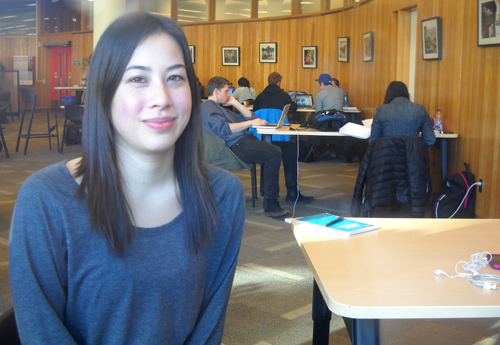
“Stack squatters” were among Guelph student research topics discussed by master’s student Sarah Christie and three U of G librarians at a conference of the Ontario Library Association (OLA) held last month in Toronto.
The Guelph group discussed how students last year used a classroom assignment in the School of Environmental Design and Rural Development (SEDRD) to generate ideas for improving University library services and resources.
Now, spurred partly by interest from other university libraries, those projects – along with similar assignments by students this semester – will be compiled into an online resource for potential use at Guelph and on other campuses, says Christie.
A master’s student in SEDRD’s capacity development and extension program, she is helping to produce the online book along with Prof. Helen Hambly. That resource will bring together library case studies done by two student classes in a graduate course in “Qualitative Methods for Research and Evaluation.”
Looking for hands-on topics for her students to explore, Hambly had connected two years ago with the library’s new user experience group, consisting of Doug Horne, Athol Gow and Robin Bergart. The library group had been looking for ways to study patrons’ behaviour.
Says Bergart, an associate librarian: “Three months later, her students were in the library discovering interesting things about our users, and we were getting some insight into how to do proper qualitative research.”
Says Christie, “It’s a great opportunity for students to practise and learn qualitative research methods and also for the user experience group to have people research in the library. There’s only so much you can get out of reading about how to conduct interviews.”
Last year students donned their “biblio-anthropologist” hats to look at the library’s graduate student learning initiative and students’ use of group study spaces. Some students mapped the library’s audiovisual area to track use patterns.
Others used floor plans and a system of coloured stickers to map student stress levels – including “library anxiety,” a term coined by an American qualitative researcher in the 1980s – in different areas.
Perhaps not surprisingly, says Christie, the first-floor lounge earned a mellow yellow sticker while the information technology help desk garnered high-alert red – although she’s careful to distinguish between cause and effect. Referring to the IT desk, she says, “If I’m there, my computer has crashed and I have a 10-page essay due in two hours.”
One group last year looked at so-called “stack squatters,” or patrons studying among library stacks rather than at desks or tables. They found that some squatters enjoy the relative solitude of the stacks; others end up there because they don’t find their desired space elsewhere.
Hambly says other patrons were dubbed an “outlet subculture,” referring to students who cluster with computers and cellphones around accessible electrical outlets.
She says this engaged learning project gave students a hands-on look at research methods, including University policy on ethics of research involving human participants. “We make sure all students understand the importance of following ethics procedures.”
Her students presented their findings to the library at the end of the semester. Bergart says the collaboration worked well, although there was less direct communication than she had hoped for between the library team and students. “This bit of outreach helped the library understand the work of the user experience team and has led to better integration of our team’s work within the library.”
Along with the Guelph librarians, Christie discussed the case studies during the OLA session this month.
Says Bergart: “The librarians in the audience were eager to hear about this experience from our perspective, but most especially from the perspective of Dr. Hambly and Sarah Christie. We’ve been attending the OLA conference for many years, and this was one of the most engaged and curious audiences we’ve seen, keen to explore how they could create a similar partnership at their own institutions.”
Working with SEDRD Prof. Al Lauzon, Christie is studying after-school programs for youths in rural communities for her graduate degree. She plans to complete her studies this spring.